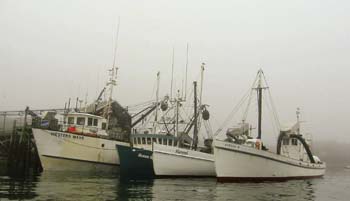Herring in a Pickle
by Laurie Schreiber
|
Big boats with lots of muscle and roving ways could one day precipitate a herring crash if something isn’t done to control the relatively unregulated fishery.
Herring is not an overfished species and two assessments, although coming up with widely disparate biomass figures, show stocks in general are doing well.
But the industry is concerned increased capacity of boats using trawl gear, as well as the potential for greater numbers of boats, could threaten stocks in the future, and has already become a problem in Area 1A, the inshore Gulf of Maine.
“The process to do something for limited access started in 1999, and now we’re looking at 2006,” said Mary Beth Tooley, executive director of the East Coast Pelagic Association (ECPA). “It’s a capacity issue. Area 1A has closed early every year since the plan was implemented.”
|

Purse seiners, Western Wave and Ocean Venture tied off with the herring carriers,
Royal and the Athena H at Stinson's canning factory in Prospect Harbor, Maine.
Summer 2003. |
The potential for overcapacity is driving the creation of Amendment 1 to the New England Fishery Management Council’s (NEFMC) Herring Fishery Management Plan, which is expected to be complemented by the Atlantic States Marine Fisheries Commission’s (ASMFC) Amendment 2.
|
Herring has been managed by the NEFMC since 2000, with a complementary inshore plan, from zero to three miles, enacted by the ASMFC. The fishery is divided into four management zones, Area 1A, 1B, 2 and 3. Areas 1A and 1B are the inshore and offshore Gulf of Maine; offshore
continue
|
|
Got Salt?
by Mike Crowe
|
Driving along an icy road behind a truck spreading salt may not have many thinking about salt as a valuable commodity. At least not valuable enough to be used like money, as it is today by Ethiopian nomads.
There may be comfort in knowing the salt is keeping those balding tires on the road, but who would at the same time think people have gone to prison for salt smuggling. Yet phrases and words such as “not worth his salt,” “red herring” and “salary” are remnants of and clues to salt’s once more prominent place in human life.
Salt, it’s always on the table at home and in restaurants, a handful of packets of it are thrown in with a bag of take out. As available as paper napkins, but cheaper, it may be the cheapest thing in the supermarket. Were it not for the talk of low salt diets it might not be given a thought, it’s just there, almost like water and air.
continue
|

Women making fish on the beach at Banks, Newfoundland, probably about 100 years
ago. The salt cod has been set on the stony beach to dry. In the background are round
piles of salt fish. Generation after generation learned how to make fish using salt most
likely brought in from Europe and the Caribbean.
|
|
  
|
|

